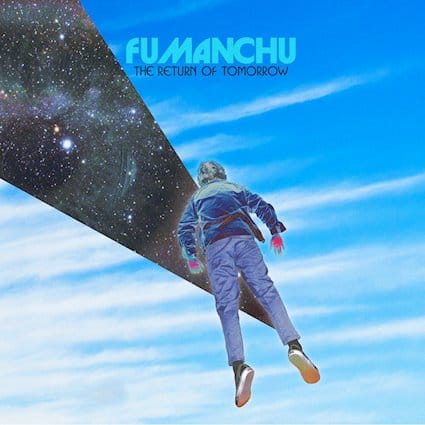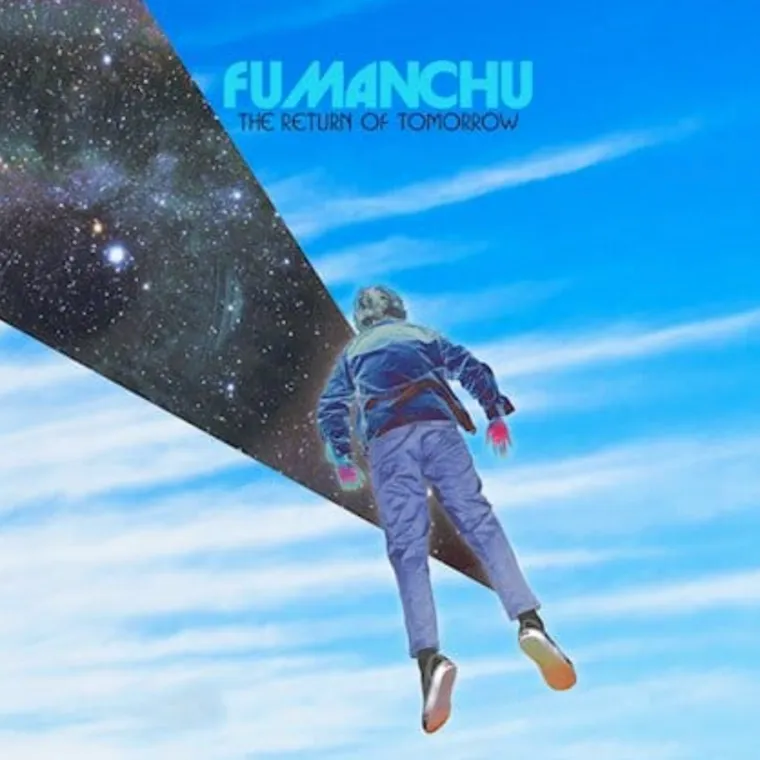One of the main reasons I started writing for a metal website was to get access to things I couldn’t get on my own: interviews with different musicians, screener copies of albums, and free tickets to events. Though I’m still waiting for the last one to come through, I have been able to speak with people from different bands on camera recently, which is a topic of discussion for another day. I also decided to take a crack at an album review, but mostly so I could get an advanced copy of Fu Manchu’s The Return of Tomorrow since I’ve been out of the torrent game for a while and I’m a big fan of the band.
The results of this attempt to write an album review for a legendary stoner rock group are below. Even though these types of pieces tend to be geared towards promoting the positive aspects of the record, I did end up enjoying it more than I expected, even if I did oversell it a little bit. I also wrote half of it in the back seat of my friend’s car on the way to Boston. Keep these things in mind when reading, and enjoy.
Veteran rockers Fu Manchu have been a model of consistency since they first picked up their instruments back in 1985. The stoner rock quartet from Orange County has released thirteen albums over the course of their thirty-plus years as a band, and if you throw any of them on, you pretty much know what you’re going to get. The riffs will be heavy and fuzzed out. The songs will be guitar driven and have lyrics about driving old muscle cars, skateboarding, or science fiction. And it will sound best when played at maximum volume.
The Return of Tomorrow, the band’s 14th full length effort, is no exception to these rules. The band’s first release in nearly six years delivers the powerful punch that fans have come to expect. Following this simple but effective formula, which elevated Fu Manchu to being one of the forefathers of the desert sound, The Return of Tomorrow picks up where the band left off with 2018’s Clone of the Universe, but with an added twist. For the first time in their long and storied career, Fu Manchu has produced a double album.

The first half of The Return of Tomorrow relies on that classic combination that Scott Hill and his bandmates have perfected over the last three decades. The second half sees the band mellow out, with six slower tempo tracks to close out the record. Or, as their frontman put it:
"I figured we should do a double record with seven heavy fuzzy songs on one record and the other record six mellow(er) songs, fully realizing that maybe I'm the only person that likes to listen to music that way."
Though most Fu Manchu releases feature some songs or sections of tracks where the band collectively takes their foot off the gas, this string of subdued jams represents the first time they’ve done so consecutively on an album. The results are impressive, as The Return of Tomorrow represents their strongest cohesive effort since 2011’s Start the Machine.
The album kicks off in familiar style, as “Dehumanize” recalls great album openers of the past like “Evil Eye” and “Hell on Wheels” with its fast paced riffing and drumming, with some classic Fu leads from Bob Balch. The lyrics remain simple and effective, which will be a theme throughout the album. Our first sci-fi venture follows, as “Loch Ness Wrecking Machine” delivers a slower but heavier blow as the second track. Though I’m not quite sure what a Loch Ness wrecking machine might be, I’d venture to guess it’s a nod to Blue Oyster Cult’s “Godzilla,” a track the band covered on 1999’s Eatin’ Dust. Regardless of what it is or isn’t, “Loch Ness Wrecking Machine” is a rocker meant to be played very loudly.
“Hands of the Zodiac,” the album’s lead single, follows next. If the title seems a little off, it’s because Hill is poking fun at a friend who might have some trouble with astrology. According to an interview with Revolver, this particular pal made tons of predictions based off the zodiac that never came true, and nearly every lyric to the song is attributed as one of his quotes. Regardless of the inspiration, the catchy nature of the track, combined with Hill’s vocal delivery, make this Fu Manchu’s best single since 2011’s “Written in Stone.”
Perhaps the heaviest track on the album, “Haze the Hides” opens with a crawling bassline from Brad Davis that leads into a crunchy, thick riff, before giving way to a plodding, punishing chorus. “Roads of the Lowly” picks the pace back up a little bit, before we reach warp speed on the blistering “(Time Is) Pulling You Under,” the album’s fastest paced track. Scott Reeder’s tenacious drumming guides this one, with Balch’s psychedelic leads complementing Hill’s frantic vocals. The group takes it down a notch to conclude the heavy portion of the record with the slower, groovier “Destroying Light” to close out Side A.
The mellower side of the record sees Fu Manchu experimenting with more psychedelic and dreamscape type bridges in between their classic riffing, with a more subdued delivery from Hill on most songs. “Lifetime Waiting” opens with a riff that evokes Sun Dial’s “Exploding in Your Mind” before kicking in during a chorus that more closely resembles the Fu Manchu you know and love. The spaced-out underbelly that follows in “Solar Baptized” is a high point of the album, combined with a simple, slow groove from Hill and Balch overhead which makes this a standout track.

“What I Need” opens with a haunting, droning melody, which is soon joined by a masterful bassline from Davis, which recalls the mellow sections of Down’s “Nothing in Return.” Hill’s almost whispered vocals give this one an eerie but cool vibe. The album’s title track and second single, “The Return of Tomorrow,” arrives next and is the closest we see the band return to their Side A form. It’s certainly the most up tempo track on Side B, but you can hear the band still holding themselves back a bit, despite tremendous drumming from Reeder and some sneaky heavy riffs.
The penultimate track, “Liquify” shares the slight restraint of its predecessor without taking away from its quality. Hill’s vocals are hushed and the band is still doing the speed limit, even if they really want to hit the gas. The album concludes with “High Tide,” a beautiful sonicscape instrumental that is highlighted by Davis’ guiding bassline and Reeder’s hand drum percussion.
The Return of Tomorrow further enshrines Fu Manchu as one of the all-time greats in the stoner rock world. The band has unfailingly delivered with each album throughout their career, proving they are one of the most dependable acts going today, with this release being no exception. The added bonus of exploring new territory with a double album concept this far into their career, and having it work with such splendid results, is another reason they are a model of consistency in the rock and metal world.

Fu Manchu is currently touring Europe through the end of June. They have a supporting North American run for the Two-Headed Monster Tour featuring Rival Sons and Clutch from mid-August to the end of September, before returning to Europe in October. You can find tour dates and ticket information at https://www.fu-manchu.com/tour-dates.
The Return of Tomorrow is out on Friday, June 14th through At the Dojo Records and will be available on all major streaming services.
- Album Rating: 7.5/10 Boogie Vans
- Standout Tracks: “Dehumanize,” “Loch Ness Wrecking Machine,” “Hands of the Zodiac,” “(Time Is) Pulling You Under,” “Solar Baptized,” “The Return of Tomorrow,” “High Tide”
- Recommendation: Rent a muscle car or dust off your old skateboard, queue up this album, and play it LOUD.
All in all, I did mean what I said about the album. It’s their best record since Start the Machine. Are some of the tracks more pedestrian than I described? Sure. But if you listen to Fu Manchu, you already know it’s the same songs repackaged from album to album, but those songs kinda rule.
- Actual Album Score: 6.5/10 Evil Eyes (it’s actually better than most of their stuff).
- Standout Tracks: These are mostly accurate except “The Return of Tomorrow” - the shoehorned chorus turns me off.
- Real Recommendation: You should still rent the muscle car or dust off the skateboard, but go back and listen to The Action Is Go or California Crossing instead.
Here’s the actual article, if you want to give me some clicks: This Day In Metal.



